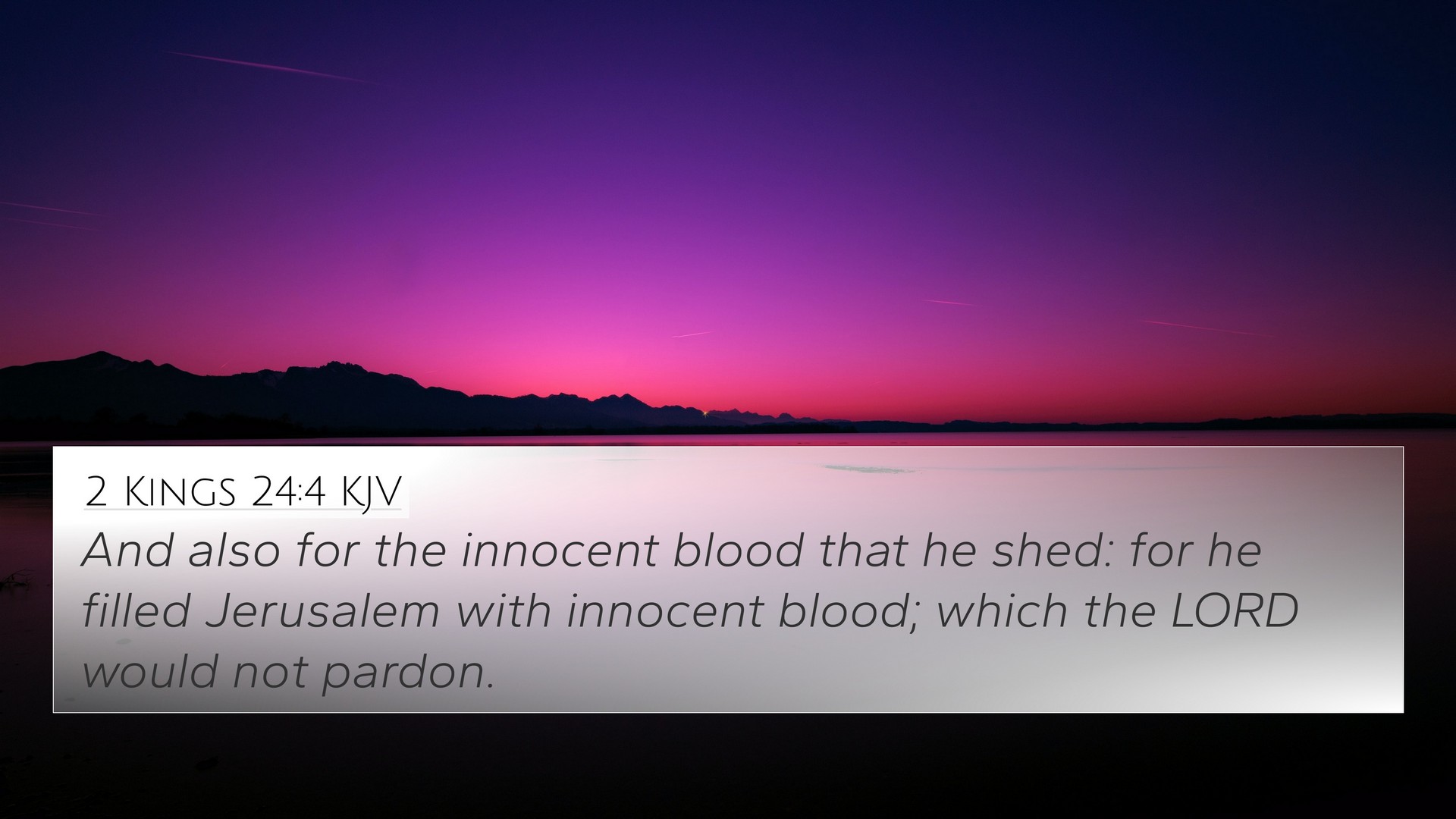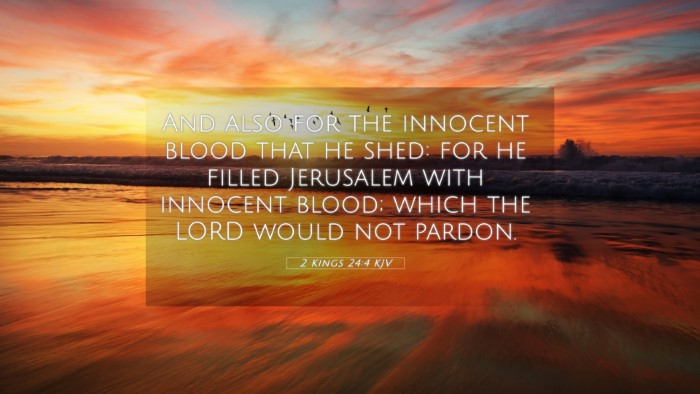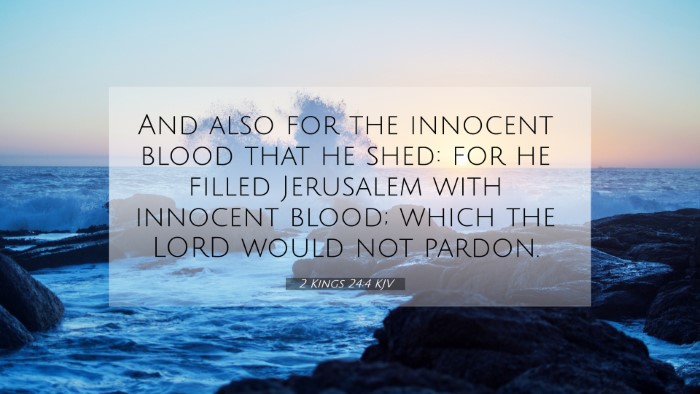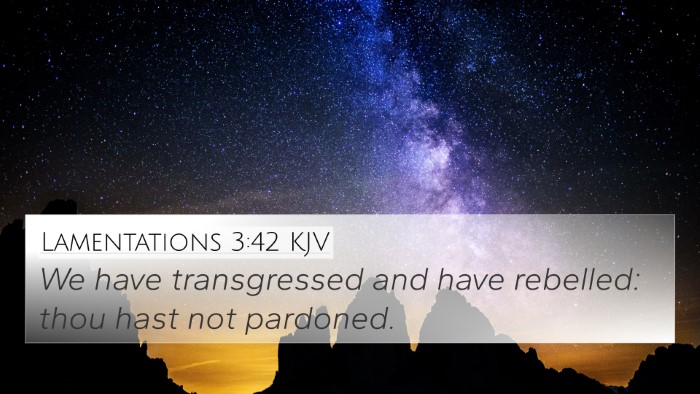Old Testament
Genesis Exodus Leviticus Numbers Deuteronomy Joshua Judges Ruth 1 Samuel 2 Samuel 1 Kings 2 Kings 1 Chronicles 2 Chronicles Ezra Nehemiah Esther Job Psalms Proverbs Ecclesiastes Song of Solomon Isaiah Jeremiah Lamentations Ezekiel Daniel Hosea Joel Amos Obadiah Jonah Micah Nahum Habakkuk Zephaniah Haggai Zechariah Malachi2 Kings 24:4 Similar Verses
2 Kings 24:4 Cross References
And also for the innocent blood that he shed: for he filled Jerusalem with innocent blood; which the LORD would not pardon.
Uncover the Rich Themes and Topics of This Bible Verse
Listed below are the Bible themes associated with 2 Kings 24:4. We invite you to explore each theme to gain deeper insights into the Scriptures.
2 Kings 24:4 Cross Reference Verses
This section features a detailed cross-reference designed to enrich your understanding of the Scriptures. Below, you will find carefully selected verses that echo the themes and teachings related to 2 Kings 24:4 KJV. Click on any image to explore detailed analyses of related Bible verses and uncover deeper theological insights.
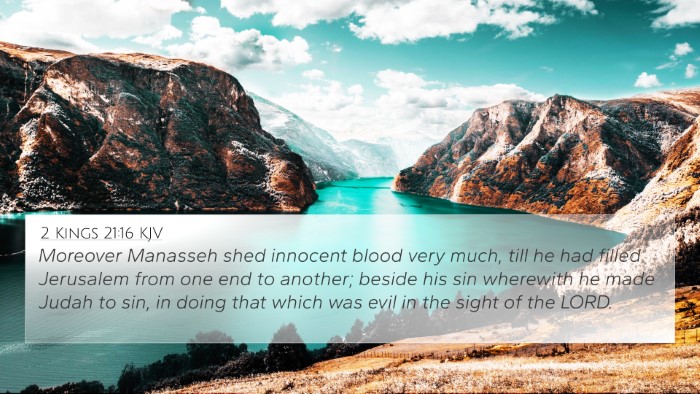
2 Kings 21:16 (KJV) »
Moreover Manasseh shed innocent blood very much, till he had filled Jerusalem from one end to another; beside his sin wherewith he made Judah to sin, in doing that which was evil in the sight of the LORD.
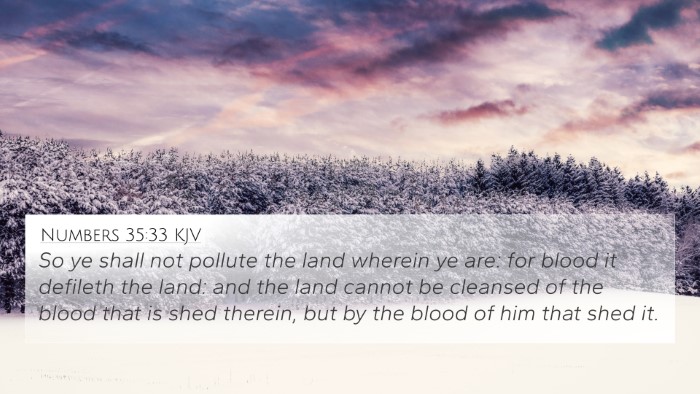
Numbers 35:33 (KJV) »
So ye shall not pollute the land wherein ye are: for blood it defileth the land: and the land cannot be cleansed of the blood that is shed therein, but by the blood of him that shed it.
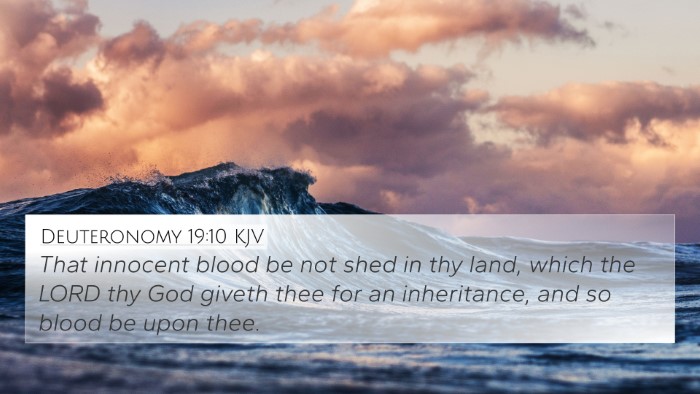
Deuteronomy 19:10 (KJV) »
That innocent blood be not shed in thy land, which the LORD thy God giveth thee for an inheritance, and so blood be upon thee.
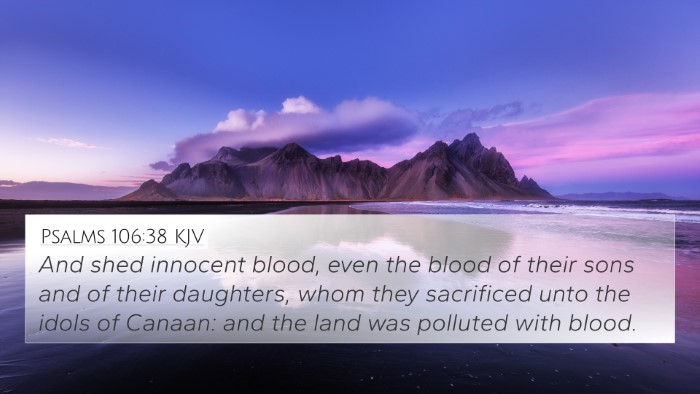
Psalms 106:38 (KJV) »
And shed innocent blood, even the blood of their sons and of their daughters, whom they sacrificed unto the idols of Canaan: and the land was polluted with blood.
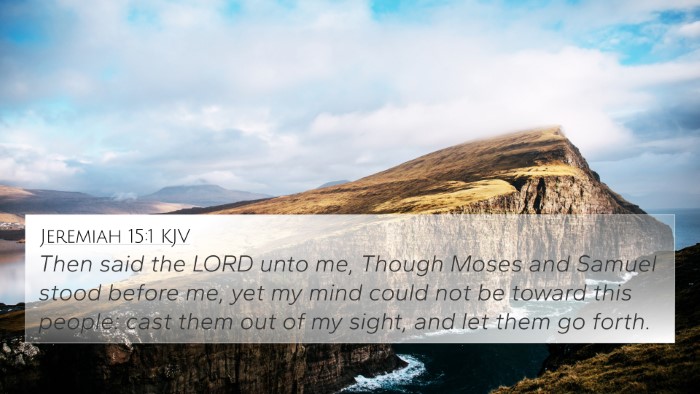
Jeremiah 15:1 (KJV) »
Then said the LORD unto me, Though Moses and Samuel stood before me, yet my mind could not be toward this people: cast them out of my sight, and let them go forth.
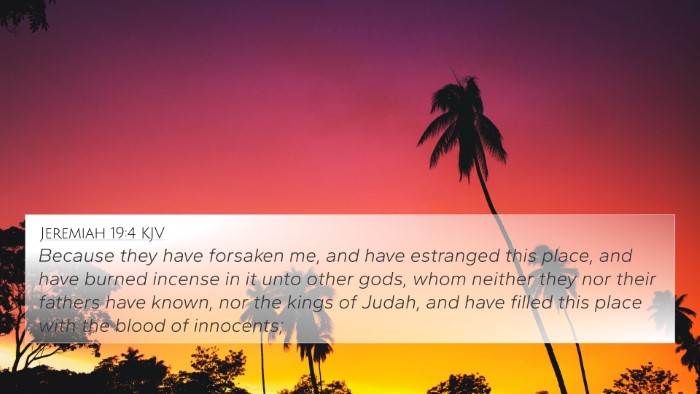
Jeremiah 19:4 (KJV) »
Because they have forsaken me, and have estranged this place, and have burned incense in it unto other gods, whom neither they nor their fathers have known, nor the kings of Judah, and have filled this place with the blood of innocents;
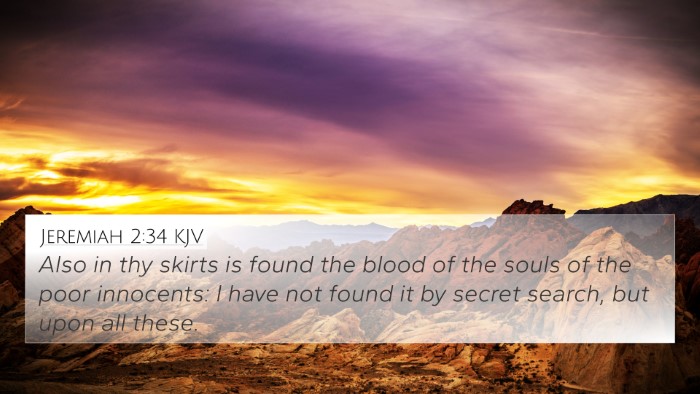
Jeremiah 2:34 (KJV) »
Also in thy skirts is found the blood of the souls of the poor innocents: I have not found it by secret search, but upon all these.
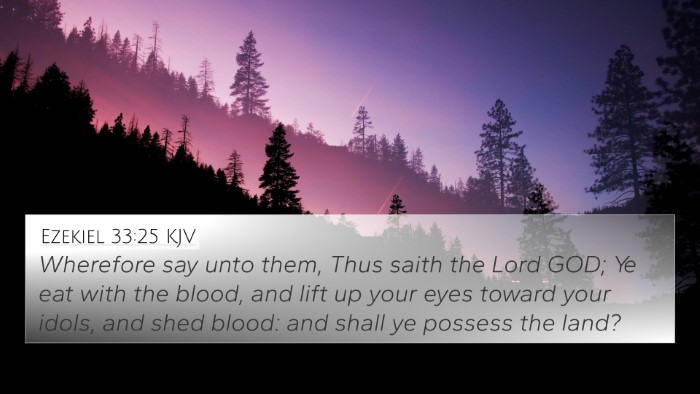
Ezekiel 33:25 (KJV) »
Wherefore say unto them, Thus saith the Lord GOD; Ye eat with the blood, and lift up your eyes toward your idols, and shed blood: and shall ye possess the land?
2 Kings 24:4 Verse Analysis and Similar Verses
Understanding 2 Kings 24:4
Context and Overview: The verse 2 Kings 24:4 states: "And also for the innocent blood that he shed: for he filled Jerusalem with innocent blood; which the LORD would not pardon." This verse speaks to the consequences of sin, particularly focusing on the severity of shedding innocent blood and how it leads to divine judgment. In this context, King Manasseh’s reign is being evaluated, specifically regarding the injustices and corruption that plagued Jerusalem during that time.
Interpretation and Insights
This verse carries profound implications regarding justice, divine retribution, and the moral failings of leadership. Below are interpretations drawn from public domain commentaries:
-
Matthew Henry:
Henry emphasizes the weight of bloodshed in the covenant community. The shedding of innocent blood is not taken lightly by God, and he asserts that the accumulated guilt of such acts can lead to national calamity. Henry suggests that God’s mercy will not overlook gross injustices, highlighting the need for repentance and accountability among leaders.
-
Albert Barnes:
Barnes points out that "innocent blood" could refer metaphorically to acts of extreme injustice against the righteous. He illustrates that Manasseh’s actions not only provoked the anger of the Lord but also set a precedent for future leaders. His commentary underlines the theological understanding that a nation pays the price for the sins of its leaders.
-
Adam Clarke:
Clarke elaborates on the historical context, explaining the idolatry and moral decay during Manasseh's time. He notes that the bloodshed mentioned in this verse not only refers to physical death but also symbolizes moral and spiritual decay. Clarke insists that God’s judgment is ultimately rooted in the rejection of His laws and the mingling of pagan practices with divine ordinances.
Thematic Connections and Cross-References
To further enhance understanding of 2 Kings 24:4, it can be insightful to connect this verse to other scripture references. Here are several relevant cross-references that highlight similar themes of bloodshed, divine judgment, and the need for righteousness:
- Genesis 4:10: "And he said, What hast thou done? the voice of thy brother's blood crieth unto me from the ground." - This verse relates the concept of blood calling for justice to God.
- 2 Chronicles 33:9: "So Manasseh made Judah and the inhabitants of Jerusalem to err, and to do worse than the heathen, whom the Lord had destroyed before the children of Israel." - This passage provides insight into Manasseh’s corruption.
- Jeremiah 7:6: "If ye oppress not the stranger, the fatherless, and the widow, and shed not innocent blood in this place, neither walk after other gods to your hurt..." - Highlights the necessity for justice and the reproof of evil acts.
- Matthew 23:35: "...that upon you may come all the righteous blood shed upon the earth, from the blood of righteous Abel unto the blood of Zacharias..." - Connects the guilt of shedding innocent blood from the past to the responsibility of the current generation.
- Acts 7:52: "Which of the prophets have not your fathers persecuted? and they have slain them which shewed before of the coming of the Just One..." - Echoes the continuous theme of rejecting and murdering the righteous.
- Micah 3:10: "They build up Zion with blood, and Jerusalem with iniquity." - This verse aligns with the theme of how iniquity leads to judgment.
- Revelation 6:10: "And they cried with a loud voice, saying, How long, O Lord, holy and true, dost thou not judge and avenge our blood on them that dwell on the earth?" - Emphasizes God's eventual judgment on those who shed innocent blood.
Conclusion
In summary, 2 Kings 24:4 serves as a sobering reminder of the consequences of unjust actions, particularly in leadership. The public domain commentaries reveal an urgent call for repentance and acknowledgment of the divine standards of justice. Through cross-referencing other biblical texts, one can see a robust framework of understanding surrounding the significance of innocent blood and God’s unwillingness to overlook such transgressions. By utilizing tools for cross-referencing and understanding these connections, believers can engage in a deeper analysis of biblical themes relevant to their faith and practice.
Further Study Recommendations
For those interested in exploring the thematic Bible verse connections and cross-referencing biblical texts further, here are a few suggestions:
- Utilize a Bible concordance to track the occurrences of “blood” throughout scripture.
- Engage in cross-reference Bible study methods that explore themes of justice and judgment.
- Explore comprehensive Bible cross-reference materials focusing on the books of Kings and Chronicles for a comparative study of Israel’s kings.
- Formulate a study plan to identify connections between Old and New Testament verses related to justice and sacrifice.
- Develop a personal Bible cross-reference guide to connect themes of bloodshed and divine judgment across various scriptural narratives.
